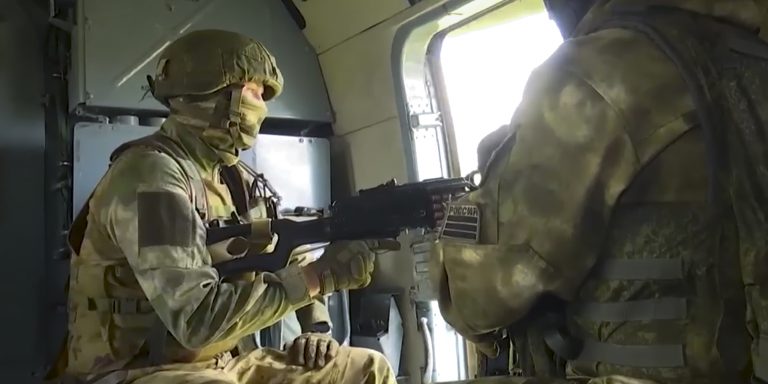INTELBRIEF
August 25, 2022
IntelBrief: Russia Leans More on Wagner Group in Sign of Growing Desperation

Bottom Line Up Front
- As the Russian military is beset by significant troop losses and sagging morale, struggles on the battlefield in Ukraine have forced the Kremlin has to turn to the private military contractor Wagner Group to fulfill some critical functions.
- Given Wagner’s reported human rights abuses, recruiting violent felons and prisoners into the organization seems likely to increase the repeated occurrence of similar incidents in the future.
- Typically operating from sub-Saharan Africa to the Middle East, Wagner members have been redeployed to the frontlines in Ukraine to bolster the Kremlin’s lackluster war effort.
- As Wagner lowers its standards to facilitate the recruitment of more fighters, it will have a direct impact on the morale of Russian forces fighting in Ukraine, as well as on the organization’s brand.
As the Russian military, beset by significant troop losses and sagging morale, struggles on the battlefield in Ukraine, the Kremlin has turned to the private military contractor (PMC) Wagner Group to fulfill some critical functions, including logistics, as well as augmenting heavy fighting on the front lines in some cases. Once an organization clouded in rumor, the Wagner Group has recently emerged from the shadows and has been featured on Russian state television, lauded as heroes; while Moscow continues to deny formal affiliation. The coverage is partly to drive recruitment, a necessity now that Russia has lost so many troops in combat (some estimates suggest more than 40,000 Russian soldiers have been killed since February). But the search for quantity has reportedly lowered the quality of recruits, with Wagner now actively recruiting from Russian prisons.
An advertisement on Vkontakte, a popular Russian social media site, proclaimed, “Do you want to spend an unforgettable summer with new friends and get profit? Travel company ‘Wagner Group’ offers tours in Europe, Africa and the Middle East.” Given Wagner’s history of reported human rights abuses, recruiting violent felons and prisoners into the organization seems likely to increase the reoccurence of such incidents in the future. There are also new billboards in Yekaterinburg seeking to reach out to new fighters and the Group has opened new recruitment centers across Russia, in dozens of cities, towns, and villages. To many outside observers, these new Wagner recruits appear little more than mere cannon fodder, provided with minimal training and sent immediately to the front lines to fight against well-equipped and battle-hardened Ukrainian forces.
Typically operating from sub-Saharan Africa to the Middle East, Wagner members have been redeployed to the frontlines in Ukraine in an effort to bolster the Kremlin’s sagging war effort. Wagner forces are now reported to be integrated into the Russian military’s command-and-control apparatus in Ukraine and its fighters are operating alongside conventional Russian forces in the Donbas. Wagner reportedly even has its own aviation unit in Ukraine, where its members operate fighter jets and is said to boast an impressive arsenal of tanks, sophisticated air defense systems, and heavy artillery. Wagner units have also been observed fighting in Popasna, where the group allegedly has established a headquarters, and in Severodnestsk and Lysychansk, captured by the Russians in early July. Wagner units have more recently been identified fighting in Bakhmut.
The fighting in Ukraine has been fierce and much different than the kind of action that a Wagner operative might experience in Mali, the Central African Republic (CAR), or Sudan, several countries where the group is also active. In those cases, Wagner fighters operate at the behest of the respective country’s leadership, and the opposition they face consists of bandits, militias, or poorly armed insurgents. Approximately 5,000 Wagner fighters are currently deployed to Africa, where they frequently engage in scorched earth tactics against local populations in order to gain access to valuable natural resources.
As the Wagner Group lowers its standards to facilitate the recruitment of more fighters, many of them reportedly subpar, it will have a direct impact on the morale of Russian forces fighting in Ukraine, as well as on the organization’s brand. This could have serious repercussions on its operations abroad, from Libya to Syria. Fewer countries are likely to seek training or partnerships with Russia more broadly, even as dictators, warlords, and strongmen in Syria, Libya, and Mali have brushed off such concerns in the past. Wagner Group operatives have been connected to several high-profile massacres in various African countries and it remains to be seen if other states would be attracted by the ‘no-strings-attached’ arrangement that Wagner seems to have negotiated with Damascus, Bamako, and Bangui.